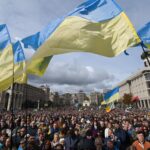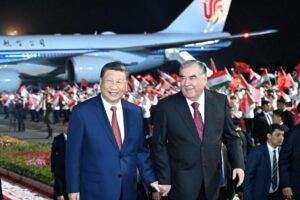Russian President Vladimir Putin on Tuesday told fellow leaders in the Shanghai Cooperation Organization that his country stands united, while thanking them for their support during the attempted mutiny by the Wagner paramilitary group.
The meeting, hosted online by Indian Prime Minister Narendra Modi, marked Putin’s first appearance in a multilateral forum since armed mercenaries threatened to march on Moscow in late June, raising questions about his grip on power.
Russia’s Sputnik state news service reported that Putin expressed appreciation to the SCO leaders, which also included Chinese President Xi Jinping. Putin called for deeper security cooperation among the bloc, the report said, while insisting that Moscow would stand up against “illegitimate sanctions.”
Modi, for his part, told the eight-nation grouping that the world faces a critical juncture amid global tensions, stressing that ensuring sufficient supplies of food, fuel and fertilizer is a major “challenge” for all countries.
Xi called on SCO members to reject protectionism and decoupling — an apparent reference to efforts by the U.S. and its allies to reduce trade and investment with China in sensitive areas. “We should make the pie of cooperation bigger, so that the fruits of development can benefit people of all countries,” he said from Beijing.
Ahead of the meeting, experts said Putin would be looking to project himself as a strong leader after Wagner threatened to march on Moscow on the weekend of June 24-25, before calling off the short-lived rebellion. He “will try to put on a brave face,” predicted Pankaj Jha, a professor of defense and strategic studies at India’s O.P. Jindal Global University, adding that Putin would also try to muster support for his objectives in the Ukraine war.
“He can do so in a congenial manner, as there are not many naysayers but mostly friends around” at the SCO, Jha said.

The loose China-led grouping was founded in Shanghai in 2001 with Russia and the Central Asian countries of Kazakhstan, Kyrgyzstan, Tajikistan and Uzbekistan. In 2017, archrivals India and Pakistan were inducted as full members in the first expansion of the organization, which aims to counter Western influence in the region. Iran completed its membership process at this summit, becoming the ninth full member.
Putin had already briefed Modi last Friday on the Wagner insurrection. The Kremlin said that during the phone call Modi “expressed understanding and support of the resolute actions by the Russian leadership to protect law and order and ensure stability in the country and security of its people.”
Xi’s presence at the SCO meeting was also closely watched. The Chinese side was apparently displeased with India’s decision to hold the summit online rather than in person, with state media implying that New Delhi was giving the bloc the cold shoulder. Xi, in contrast, last year made the SCO summit in Uzbekistan his first foreign trip since the outbreak of COVID-19.
“Even if India is cold toward the SCO or acts as an obstacle on certain issues, China and other members can simply exclude India from cooperation,” the nationalist tabloid Global Times warned in an opinion piece published last month.
But Indian Foreign Secretary Vinay Kwatra told reporters after Tuesday’s talks that the virtual format “in no way signifies, hints [or] insinuates the dilution in the objectives that we are trying to seek” through the SCO.
In his opening remarks to the leaders, Modi said the SCO had emerged as an important platform for peace, prosperity and development across the whole of Asia in the last two decades. He pointed out that under India’s chairmanship this year, it has promoted five new pillars of cooperation — startups and innovation, traditional medicine, youth empowerment, digital inclusion and shared Buddhist heritage.
Modi also urged the bloc to work together to help Afghanistan. But in a veiled jab at Pakistan, he said some nations are using cross-border terrorism as an instrument of their policies and harboring terrorists. “The SCO should not hesitate in condemning such countries,” he said.
Kwatra told the media that the leaders adopted a New Delhi Declaration as well as two other joint statements — one on cooperation in countering radicalization leading to separatism, extremism and terrorism, and another on cooperation toward digital transformation.
The secretary added that the leaders welcomed the completion of Iran’s full membership, and that the process for Belarus joining would be completed by next year’s SCO summit. Wagner leader Yevgeny Prigozhin went to Belarus after the uprising.

Even if China would have preferred an in-person meeting, the virtual venue may have been a blessing in disguise for Xi and some of his peers.
Although Beijing regarded the aborted uprising against the Kremlin as Russia’s “internal affair,” the Chinese president may have been wary of being pictured side-by-side with his “no limits” friend Putin so soon after the latter’s authority was challenged.
The online format allowed Modi to avoid potential awkwardness as well.
India maintains a good relationship with Russia, the supplier of most of its defense equipment. New Delhi has refrained from explicitly condemning the Kremlin over the Ukraine war, calling instead for dialogue and diplomacy. But Modi was coming off a successful state visit to the U.S., Moscow’s nemesis.
“Perhaps, given the internal contradictions within the SCO, the argument was ‘let’s do it virtually because that’s a more stable format,'” said Harsh V. Pant, a professor of international relations at King’s College London and vice president of studies and foreign policy at New Delhi’s Observer Research Foundation think tank.
Besides the Russia factor, ties between India and China have also been souring amid their rivalry for regional leadership and a lingering Himalayan border standoff in Eastern Ladakh, where their troops engaged in deadly hand-to-hand combat in 2020.
Last week, India also joined the Philippines in urging China to adhere to a 2016 international arbitration ruling that struck down Beijing’s claims to much of the South China Sea. Until then, New Delhi had only “noted” the decision, which China considers “null and void.”

Then there are the tensions between India and fellow SCO member Pakistan — two nuclear powers long at odds over control of Kashmir. Pakistani Prime Minister Shehbaz Sharif on Tuesday thanked India for steering the SCO this year and acknowledged the scourge of terrorism, while hitting back by saying the issue should not be used to score diplomatic points.
The SCO “has been constrained by differences among its members,” said Yogesh Gupta, a former Indian ambassador and secretary in the Ministry of External Affairs. These include a range of practical and historical issues as well as fundamental ones: Gupta noted that China is pushing for “more of a Beijing-led global order” whereas India prefers a multipolar world.
Source : asia.nikkei
















